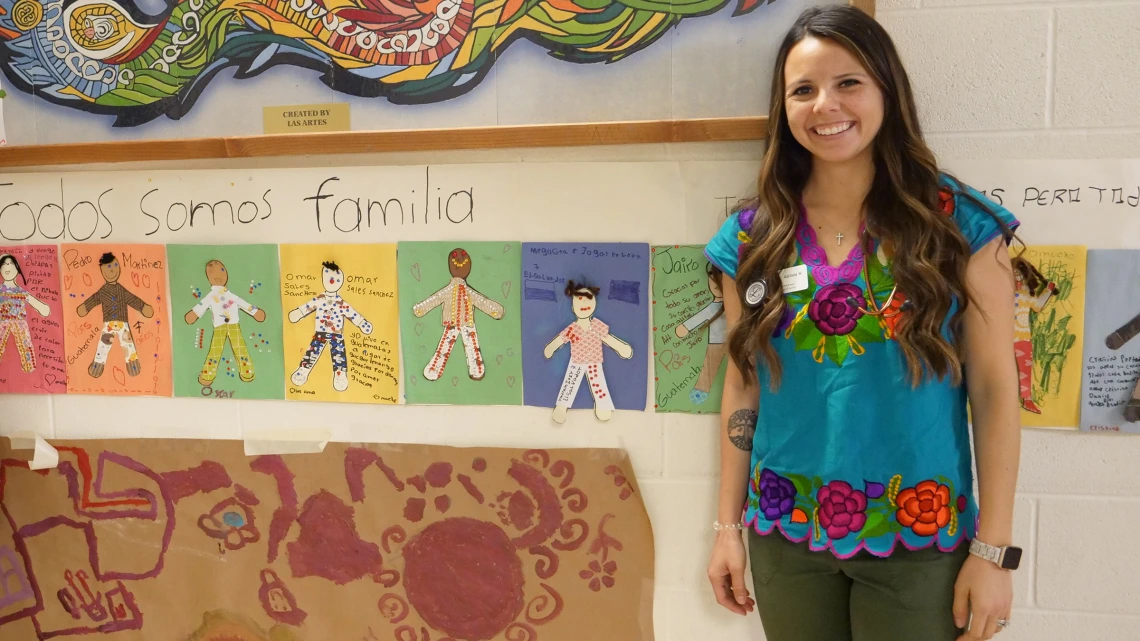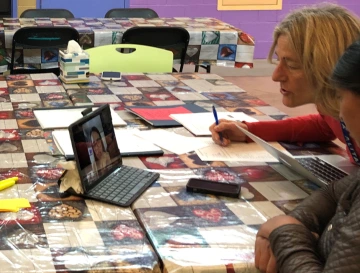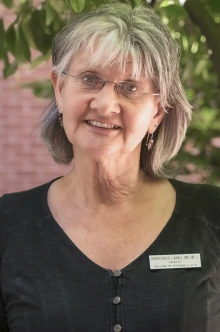Nursing College Uses Telehealth Program to Continue Clinical Education
When the pandemic put an end to in-person clinical education experiences, the college leaned on its telehealth infrastructure.

UArizona College of Nursing DNP-FNP student Adriana Warne uses telehealth to conduct remote wellness checks and gain clinical hours otherwise unavailable during the COVID-19 pandemic.
As people adapt to social distancing and work-from-home measures due to COVID-19, the importance of telecommunications never has been more critical – especially in health care – and now it’s taking on new significance in health care education.

DNP-FNP student Adriana Warne (on screen) conducts a remote wellness check with Guatemalan client and an interpreter.
A core component of nursing education is the clinical experience: students participate in supervised learning sessions in real-world health-care environments, which provide an opportunity to put what they have learned in the classroom into practice.
In the midst of a global pandemic, the telehealth certificate program at the University of Arizona College of Nursing provides clinical experience for its students in the Family Nurse Practitioner Program.
The UArizona nursing telehealth program allows students to learn about the distribution of health-related services and information via electronic information and telecommunication technologies. It fosters long-distance patient and clinician contact, care, advice, reminders, education, intervention and monitoring.
One such notable program is a partnership with Casa Alitas, a program run by Catholic Community Services of Southern Arizona, Inc. that offers short-term shelter to migrants on the beginning stages of their immigration journey. This semester, students began performing well-child assessments on migrant children at the facility with the goal to prepare them to start school when they reach their sponsor’s home city.

Audrey Russell-Kibble, DNP, FNP-C, FAANP
Student Adriana Warne, BSN, RN, had completed 32 of her clinical hours at Casa Alitas. Warne is working on her DNP project to develop a Migrant Well-Child Health Toolkit for the program. She worked with Dr. Russell-Kibble to prepare for the transition to telehealth screenings, translating the Casa Alitas Medical Screening Tool into Spanish to prepare for her first remote wellness check.
She worked with an intake person to aid with the interview of a mother from Guatemala and her four children and interfaced with interpreters to successfully complete the screening.
“The intake person gave Adriana high marks for her respectful and culturally competent gentle manner with the migrant mother and her family,” Dr. Russell-Kibble said.

Allen Prettyman, PhD, FNP-BC, FAANP
Warne said the experience was incredible, and called the telehealth technology invaluable as students learn how to adapt to assess patients and families during the COVID-19 pandemic.
“Since I already completed in-person clinical time at Casa Alitas for the semester, being able to apply a telehealth approach to clinical care really brought my clinical experience to another level,” she added. “This opportunity allowed me to use what I learned thus far in my didactic coursework about telemedicine and cultural competency. I also applied what I learned in my clinical work by exercising my clinical judgment without being physically present with the family.”
During the screening, Warne built a rapport with the family by working with two interpreters, one who spoke Mam (an indigenous Mayan language in Guatemala and the Mexican state of Chiapas) and one who was bilingual in English and Spanish. The Mam language interpreter was present at the visit by telephone, but the migrant woman was able to see Warne face-to-face on an iPad furnished by the college.
“I know this experience will enhance my DNP project, and I can’t thank Casa Alitas and the College of Nursing enough for this unique opportunity to apply this innovative approach to clinical care,” Warne said. “Hopefully, more students will have the opportunity to use telehealth technology, because I have a feeling once everything settles with COVID-19, telemedicine is going to grow exponentially and become a more common approach to clinical practice.”

